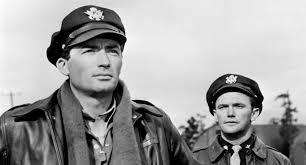
"I believe that to a certain degree, a man makes his own luck."
Henry King's Twelve O'Clock High (1949) is one of Hollywood's best World War II films. It's as unconventional to its genre as King's The Gunfighter is to the Western: less a traditional war picture than an incisive study of men under pressure, ground down through a job that's hazardous, thankless and seemingly endless.The American 918th Bomb Group, based out of Archbury, England, runs heavy bombing raids against targets in Nazi-occupied Europe. After a costly mission, General Pritchard (Millard Mitchell) sends in Brigadier General Frank Savage (Gregory Peck) to whip the Group into shape. He demotes the ineffective Colonel Davenport (Gary Merrill) and punishes officers and men for inefficiency and poor decision-making. The men initially loathe Savage but come to respect him when his approach achieves results; Savage, however, finds command and the endless bombings taking a personal toll.
Adapted by Sy Bartlett and Barney Lay, Jr. from their own novel, Twelve O'Clock High has been a longtime favorite of servicemen and anyone interested in management. Its popularity no doubt stems from its grim mix of banality and terror, with a single bombing raid cribbed from stock footage. King shows their effects through horror stories (men mangled and driven mad by flak) and endless, excruciating waiting: the film's iconic scene has a ground crew playing catch on the runaway, not knowing if their colleagues will ever return. His direction is sparse but striking, with deep-shadowed interior scenes of brooding officers, always accompanied by the drone of plane engines (Alfred Newman's sparse score only appears during the bookends).
Equally appealing are High's central characterizations. Colonel Davenport loves his men so well he's reluctant to reprimand them for mistakes, whereas Savage will demote men for seemingly minor infractions. He's no Captain Queeg though, as there's a definite method to his madness: his tough approach re-configures the 918th from a hard-luck outfit to one tapped for the Air Corps' most important missions. This extends to Davenport, whose demotion to a crew of cast-offs (the "Leper Colony") inspires him to newfound heroism, and Major Stovall (Dean Jagger), an adjutant made to realize he's more valuable on the ground than in the air.
And Savage is far more than a martinet. He's a savvy bureaucrat who ensnares transfer requests in red tape, gambling that by the time headquarters sees them the men will have changed their minds. But he's also grimly effected by the losses, visiting wounded officers in hospital and finding himself traumatized by combat. If Davenport's too accessible to his men, Savage veers too far the other way, repressing his empathy until it drives him mad. Ultimately he's sidelined for a final bombing mission, having destroyed himself in the remolding.
Gregory Peck is perfectly cast, his rock-hard rectitude fitting Savage like a glove. Peck's such a grim hardass that when his humanity starts to show through near the end, it's extremely moving. He's given a stellar ensemble in support: Dean Jagger's long-suffering adjutant, Gary Merrill's glad-handing executive officer, John Kellogg as a tough guy, Hugh Marlowe as a reluctant hero. There's an especially affecting role for Robert Patten, as a decorated veteran to whom Savage makes his most heartfelt appeal.
Like Battleground and other late '40s war movies, Twelve O'Clock High speaks to deeper truths than exciting action or battlefield heroics. War isn't all explosions and killing, even if those are the ends; the difficulties of responsibility, decision-making, clashing personalities and even boredom play their role in making it hell.

